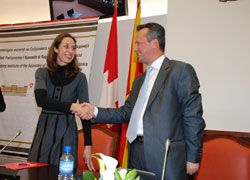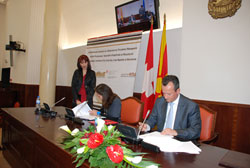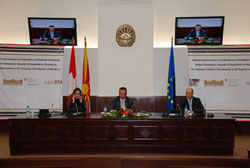Monday, 17 May 2010 ADDRESS BY THE PRESIDENT OF THE ASSEMBLY OF THE REPUBLIC OF MACEDONIA, MR. TRAJKO VELJANOSKI ON THE OCCASION OF THE SIGNING OF THE MEMORANDUM OF UNDERSTANDING BETWEEN THE SWISS FEDERAL COUNCIL AND THE ASSEMBLY OF THE REPUBLIC OF MACEDONIA 
Your Excellency Ambassador Wyrch,
Distinguished Vice-Presidents of the Assembly of the Republic of Macedonia
Distinguished Coordinators of the Parliamentary Groups
Dear Colleagues Members of Parliament,
Members of the Assembly Staff,
Representatives of the International Community,
Distinguished guests,
I am very pleased that today we are signing an important document for the development of capacity of our Parliament. On this small ceremony, together with Her Excellence Ms. Nicole Wyrch, Ambassador of the Swiss Confederation to the Republic of Macedonia, we will sign the Memorandum of Understanding for support of the establishment and development of the Parliamentary Institute of the Assembly of the Republic of Macedonia.
Our joint commitment is strengthening the overall capacity of the Assembly. Last year we demonstrated this commitment with the adoption of the Law on the Assembly of the Republic of Macedonia. This act confirms our dedication for further parliamentary development. The improvement in the preparation of the legislative process contributes to increased functionality and autonomy of the Assembly, and strengthens the principle of division of power, the rule of law and development of democracy in the Republic of Macedonia.
The European Commission 2009 Progress Report of the Republic of Macedonia clearly reflected our commitment for democratic reform and strengthening of our institutional capacity.
The Parliamentary Institute will be a professional and independent body which will prepare for the Assembly of the Republic of Macedonia, the MPs and the Assembly Staff objective and unbiased research, comparative analyses of the European laws, and enable access to a modern archive system and research library in the field of legislation. The Staff of the Institute will assist the MPs, the Assembly Staff and the interns, as well as provide public relations services. The work of the Parliamentary Institute will be based on the principle of impartiality, accessibility and credibility – as a result of the potential which will be relevant and competitive in a wider framework.

Our expectations are that after the introduction of such an analytical and research service for the needs of the MPs, the legislative and supervisory role of the Assembly of the Republic of Macedonia will be greatly improved. In this sense I expect the scrutiny debates, initiated this year, will become a powerful instrument which will improve the quality and effectiveness of our work. The strengthening of the Assembly of the Republic of Macedonia with new human resources in the last few years, together with the securing of more offices for the MPs and the Assembly Staff, should optimize our overall parliamentary capacity. The activities for finalization of the process of opening constituency offices for contacts with the citizens, which was also supported by our Swiss partner, should enable more intensive communication with the citizens and for receiving their proposals, assessments and opinions.
Ladies and Gentlemen,
The establishing of an impartial and professional Parliamentary Institute which will provide information, research, analysis, internal training and public relations is widely supported by all the parties represented in the Assembly of the Republic of Macedonia.
On this occasion I would like to express gratitude to the Coordinators of the Parliamentary Groups and to all our colleagues and members of Staff for their dedication, leadership and support for the creation of the Parliamentary Institute.
The Assembly of the Republic of Macedonia has invested funds in order to secure adequate workspace for the Parliamentary Institute in the framework of the Assembly of the Republic of Macedonia. The renovation of the working facilities should be finalized in near future. The Assembly of the Republic of Macedonia will also take over the expenses for functioning of the Parliamentary Institute from the beginning of 2011.
A team of 24 highly qualifies analysts, researchers and lecturers, including lawyers, economists, historians, librarians and ICT specialists, will provide services in Macedonian and Albanian language, and the employees in the Parliamentary Institute will also have to know English or French language in order to carry out comparative research and to be able to exchange information with their European colleagues.
The Assembly research library and archive will be also modernized with the introduction of digital archiving, acquisition of new books and publications of global databases in the field of legal research and analysis.
All of this will provide the Parliamentary Institute the necessary facilities, staff and technical resources, which the Assembly needs as a significant support for the Euro-Atlantic integration processes of the country.

On behalf of the Assembly of the Republic of Macedonia, I would like to convince you that we will give our parliamentary support in order to secure an open, transparent, competitive and rigorous process of employment of highly professional staff, capable of providing independent, analytical and comparative research. I am pleased that in these efforts we have the support of our partners – the Swiss Agency for Development and Cooperation, and of our friends – the National Democratic Institute. With their assistance we will have a truly independent Parliamentary Institute, characterized by impartiality, accessibility, credibility, capable of providing leadership and support.
I would also like to use this opportunity to express gratitude not only to our Swiss partners, but also to the Embassy of the United States of America, the United Kingdom of Great Britain and Northern Ireland, the Czech Republic and the Slovak Republic for their continuous support for our parliamentary development and for the realization of this initiative; as well as to USAID, the House Democracy Partnership of the US Congress, The European Centre for Parliamentary Research and Documentation, the Westminster Foundation and the Czech and Slovak Parliamentary Institutes.
Thank you.